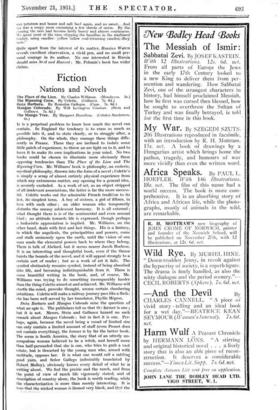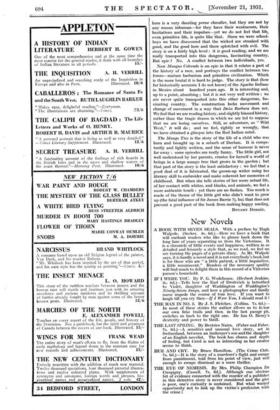Fiction
Nations and Novels
Gollancz. 7s. 6d.)
IT is a perpetual problem to know how much the novel can contain. In England the tendency is to cram as much as possible into it, and to state clearly, or to struggle after, a philosophy. On the whole, they manage these things diffe- rently in France. There they are inclined to isolate some little patch of experience, to throw an arc light on to it, and to leave it to make its own implications in your mind. No two books could be chosen to illustrate more obviously these opposing tendencies than The Place of the Lion and The Ripening Corn. Mr. Williams' book is philosophy, an esoteric, mystical philosophy, thrown into the form of a novel ; Colette's is simply a scrap of almost entirely physical experience from which any extraneous matter, any opening for a general idea, is severely excluded. As a work of art, as an object stripped of all irrelevant associations, the latter is far the more success- ful. Colette works out the admirable French tradition to its last, its simplest term. A boy of sixteen, a girl of fifteen, in love with each other ; an older woman who temporarily disturbs the uneasy adolescent harmony. It is all external ; what thought there is is of the sentimental and even sensual kind ; no attitude towards life is expressed, though perhaps a hedonistic appreciation is implied. Mr. Williams, on the other hand, deals with first and last things. His is a fantasy, in which the angelica's, the principalities and powers, come and stalk ominously upon the earth, until the vision of one man sends the elemental powers back to where they belong. There is talk of Abelard, but it seems nearer Jacob Boehme. It is an interesting and thoughtful book, even if the theme bursts the bounds of the novel, and it will appeal strongly to a certain sort of reader ; but as a work of art it fails. The symbol obstinately remains symbol, instead of being absorbed into life, and becoming indistinguishable from it. There is some beautiful writing in the t'book, and, of course, Mr. Williams was trying to do something incomparably harder than the thing Colette aimed at and achieved. Mr. Williams will startle the mind, provoke thought, arouse certain slumbering intuitions. Colette will make a railway journey pass like a flash: she has been well served by her translator, Phyllis Megroz.
Doha Barbara and Matzos Colorado raise the question of what an epic is. The publishers tell us that the former is one ; but it is not. Messrs. Stein and Gallancz hazard no such remark about Mangus Colorado ; but in fact it is one. Per- haps, again, because the novel being a vessel of limited size can only contain a limited amount of stuff (even Proust does not contain everything), the former is by far the better book. The scene is South America, the story that of an utterly tin- scrupuloUs woman believed to be a witch, and herself more than half-persuaded that she is one, who tries to grab a vast estate, but is thwarted by the young man who, armed with
rectitude, opposes her. It is what one would call a rattling good yarn, and Senor Gallego (admirably translated by
Robert. Malloy), obviously knows every detail of what he is writing 'about. We feel the prairie and the ranch, and from the point of view of ranch life vigorously stated, and of description of country alone, the book is, worth reading, while the characterization is more than merely interesting. It is true that the wicked woman ia Mimed very bliiek, and tIlgt the hero is a very dazzling preux chevalier, but they are not by any means inhuman—for they have their weaknesses, their hesitations and their impulses—yet we do not feel that life, even primitive life, is quite like that. Since we were school- boys we have discovered that the wicked are streaked with good, and the good here and there splotched with evil. The story is on a fairly high level : it is good reading, and we are really transported into this dangerous, fascinating country. But epic ? No. A conflict between two individuals, yes.
Now Mangus Colorado is an epic in that it relates a part of the history of a race, and portrays the conflict between two forces—mature barbarism and primitive civilization. Which is the more brutal it is hard to judge. The story is that (how far historically accurate I do not know) of the Apache Indians in Mexico about hundred years ago. It is interesting and, up to a point, absorbing ; but it is not very well written : we are never quite transported into this other dangerous, fas- cinating country. The construction lacks movement and change of movement in a way that Doha Barbara does not. We feel that we are reading history, and slightly biassed history, rather than the tragic drama in which we are led to suppose that we are losing ourselves. Still, as adventure, as " Wild West," it will do ; and we feel, rightly or wrongly, that we have obtained a glimpse into the Red Indian mind.
The Mango Tree is the story of the life of a child who was born and brought up in a suburb of Durban. It is compe- tently and lightly written, and the sense of humour is never far away : some episodes are really funny. The little girl, not well understood by her parents, creates for herself a world of beings in a large mango tree that grows in the garden ; but that part of the story is the least satisfactory : . we feel that a good deal of it is fabricated, the grown-up writer using her literary skill to embroider and make coherent her memories of childhood. But when she tells stories of her more actual life, of her contact with whites, and blacks, and animals, we feel a more authentic touch : yet there are no flashes. Too much is made of the theme of the little girl who didn't want to grow up (the fatal influence of Sir James Barrie ?), but that does not prevent a good part of the book from making happy reading.
BONA MY Donazz.

































































 Previous page
Previous page